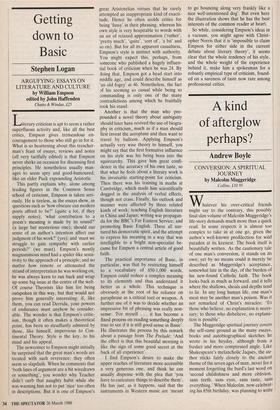Getting down to Basic
Stephen Logan
ARGUFYING: ESSAYS ON LITERATURE AND CULTURE by William Empson edited by John Haffenden
Chatto & Windus, f25
Literary criticism is apt to seem a rather superfluous activity and, like all the best critics, Empson gives tremendous en- couragement to those who still go in for it. What is so heartening about this trencher- man's feast of essays, reviews and notes (all very tactfully edited) is that Empson never shirks an occasion for discussing first principles. He nonetheless usually man- ages to seem spry and good-humoured, like an elder Puck expounding Aristotle.
This partly explains why, alone among leading figures in the Common Sense school of criticism, Empson is taken seri- ously. He is tireless, as the essays show, in questions such as 'how obscure can modern poets afford to be?' (quite a lot, if they supply notes); 'what contribution to a poem's meaning is made by its sound?' (a large but mysterious one); should our sense of an author's intention affect our judgment of his work?' (yes); and 'must we struggle to gain sympathy with earlier periods?' (we must). Empson's mostly magnanimous mind had a spider-like sensi- tivity to the approach of a principle; and no matter how remote or attenuated the strand of interpretation he was working on, he was always keen to run back and wrap up some big issue at the centre of the web. Of course Theorists like him for being outspoken in this way, but that would not prove him generally interesting: if, like them, you can read Derrida, your powers of endurance must anyhow be consider- able. The wonder is that Empson's critic- ism, though it often makes a theoretical point, has been so steadfastly admired by those, like himself, impervious to Con- tinental Theory. Style is the key, to his mind and his appeal.
The newcomer to Empson might initially be surprised that the great man's words are treated with such reverence: they often seem so slapdash. When he comments that `both lines of argument are a bit wiredrawn or something', you wonder why Teacher didn't curb that naughty habit while she was warning him not to put `nice' too often in descriptions. But it is one of Empson's great Aristotelian virtues that he rarely attempted an inappropriate kind of exacti- tude. Hence he often scolds critics for being 'fussy' in their phrasing, whereas his own style is very hospitable to words with an air of relaxed approximation (`rather', `pretty much', 'quite', 'sort of, 'a bit' and so on). But for all its apparent casualness, Empson's style is instinct with authority.
You might expect this, perhaps, from someone who published a hugely influen- tial book of criticism when he was 24. By doing that, Empson got a head start into middle age, and could describe himself as `an old fogey' at 46. Nonetheless, the fact of his seeming so casual while being so commanding is only one of the many contradictions among which he fruitfully took his stand.
Another is that the man who pro- pounded a novel theory about ambiguity should later have revived the use of biogra- phy in criticism,, much as if a man should first invent the aeroplane and then want to travel by balloon. Applying Empson's actually very wise theory to himself, you might say that the first formative influence on his style was his being born into the squirearchy. This gave him great confi- dence in the accuracy of his own taste, so that what he feels about a literary work is his invariable starting-point for criticism. Then there was his training in maths at Cambridge, which made him scientifically dogged in the analysis of verbal effects, though not crass. Finally, his outlook and manner were affected by three related kinds of work; teaching English literature in China and Japan; writing war propagan- da for the BBC's Far Eastern Service; and promoting Basic English. These all nur- tured his democratic spirit, and the attempt to express his meaning in a way that was intelligible to a bright non-specialist be- came for Empson a central article of good faith.
The practical importance of Basic, in particular, was that by restricting himself to a vocabulary of 850-1,000 words, Empson could reduce a complex meaning to its elements and thus understand it better as a whole. This technique is obviously at the root of his reliance on paraphrase as a critical tool or weapon. A further use of it was to decide whether an impressive bit of phrasing was really non- sense: 'For myself . . . it has become a fixed process on reading something deeply true to see if it is still good sense in Basic'. He illustrates the process by this remark about a passage from The Prelude: 'And the effect is that this beautiful morning is like the sign of some good secret at the back of all experience'.
I find Empson's desire to make the upper reaches of literature more accessible a very generous one, and think he can usually dispense with the plea that 'you have to caricature things to describe them'. He has just, as it happens, said that the instruments in Western music are 'meant to go bouncing along very frankly like a nice well-intentioned dog'. But even here the illustration shows that he has the best interests of the common reader at heart.
So while, considering Empson's ideas in a vacuum, you might agree with Christ- opher Norris that it is 'impossible to claim Empson for either side in the current debate about literary theory', it seems clear that the whole tendency of his style, and the whole weight of the experience behind it, make him a spokesman for a robustly empirical type of criticism, found- ed on a sureness of taste now rare among professional critics.


















































 Previous page
Previous page